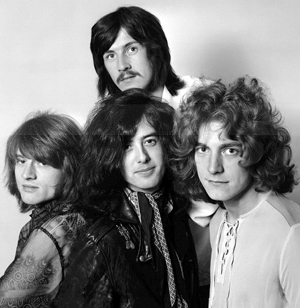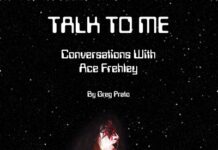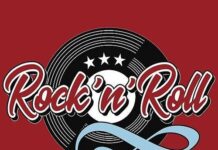By Carl Cunningham
In the crowded world of classic heavy metal and hard rock, there was none harder and heavier than Britain’s Led Zeppelin.Since their formation in 1968 as an offshoot of the Yardbirds, Jimmy Page, Robert Plant, John Paul Jones and John Bonham blazed a bluesy, womanizing, devilish trail few could ever dream of matching. In their hey day, Zeppelin offended the critics, angered religious groups, riled up rednecks and worried parents of teenagers from Alabama to Zurich.
My officiation into the Church of Led Zeppelin took root in Southeast Texas when I was a long-haired, teen-aged hippie journalist. If you’re not familiar with the Southern United States where I was born and raised, here’s a bit of a cultural primer. Southeast Texas is basically the steel belt buckle in the sexually repressed, church-loving American “Bible Belt” you’ve heard about. In the strict Southern Baptist church I was raised in, dancing was out — in fact — it was absolutely forbidden as “the Devil’s doing.” Dating was restricted to those 16 and over and monitored as closely as death row inmates in a Super Max prison. Such Devil’s-doings as guitars, rock music and live concerts were certainly grounds for an exorcism, excommunication or at the very least, getting a young kid locked up in what they called a “retreat,” which was basically Baptist code for hiding away a kid that didn’t conform to church standards of dress, hairstyle and purient interests.
My first exposure to music that didn’t involve hymnals and Bonnie (the overweight organ player at our church) came innocently enough. I listened faithfully to B-95 FM, the only station in our area that played anything other than Christian or Country music. They did a nightly “Top 5 at 9” countdown that I’d listen to on my cheap dollar store radio in the dark. Naturally, the countdown left a lot to be desired, especially when Lisa Lisa & Cult Jam or Huey Lewis sat atop the chart night after mind numbing night, but that stupid little countdown sowed a music loving seed in me that would grow to a massive heavy metal plant in no time at all. I entered sixth grade and took band to get out of taking drama, foreign language or farming classes. I couldn’t blow a reed or finger a flute, but I could keep time with a pair of drum sticks. Music began to surround my life, but it wasn’t until the next summer that I had found my life’s calling.
A simple drumbeat and snarling lead guitar in the background of a Nike commercial made me run to the television every time it came on. It was 1987, and “Revolution” by the Beatles came blaring out of our television like a chorus of angels from above, beckoning me from afar. My addiction was on after that — music overwhelmed my raging teenage hormones and filled everything in my life, from band tee shirts I bought and my Ringo haircut to the collage of posters that covered my walls and ceiling.
As much as I loved the Beatles, a yearning for a darker, heavier sound churned within me, satisfied only briefly by the raucous “Helter Skelter” on The White Album, a record my devout father forbid me from buying, fearing I’d cross over to the darkside and commit some insane Devil deed. My infatuation with the Beatles coincided with the 20th anniversary of the famed Summer of Love. That summer, MTV (back when they actually had music on the air) showed numerous programs on Woodstock, Jimi Hendrix and the psychedelic movement.
One video clip introduced by Kurt Loder blasted out of the tiny television speakers like a bolt of lightning shot from the very hand of God himself: It was approximately one minute of footage from “Dazed and Confused” from an unreleased Danish TV special Led Zeppelin filmed back in 1969. It lasted just under 60 seconds, but it felt like an eternity for me. I sat on the tile floor of our living room, enraptured at the musical spectacle before me. Some skinny longhaired rock god I’d never heard of weilded a violin bow, smacking it up and down the neck of his day-glo painted Fender Telecaster like a dominatrix mercilessly whipping a submissive masochist. That minute-long, pseudo-erotic electric blues rock interlude was my first glimpse into the gloriously loud, bombastic, raunch-n-roll world of the mighty Led Zeppelin.
Who was this Led Zeppelin? My parents claimed ignorance. This was back in the 1980s before anything in the universe could be found on Google, so I had to do a clandestine, hard target search of libraries, music stores and news stands to search out info on Zeppelin — no easy feat since my parents were eagle-eyed conservative Christian hawks, always on the lookout to keep my innocent eyes, ears and hands away from all things evil.
Later that summer, we took a day trip to Galveston, Texas. My parents and sisters ducked in to a seashell shop on the seawall (yes, sea shells down by the sea shore…) I slipped away and found a hole-in-the-wall record store with thousands of rock cassette tapes. My eyes ran up and down the rows: Aerosmith, Beatles, Creedence, Doors… speeding over the letters until I got to “L.” My eyes must have popped out of my head. The clerk — who bore a striking resemblance to Tommy Chong — leaned over and says, “Their second album… good stuff, man.” I whipped out eight dollars and tore off out of the store.
With my copy of Led Zeppelin II shoved down the front of my shorts for safekeeping, I sprinted down the seawall back to my parent’s station wagon. To my surprise, the keys were in the ignition, and the car was unlocked. I unwrapped Zeppelin’s second and cranked up the sound on the tape deck. A quiet, nervous cough emanated from the speakers, followed by the most amazing guitar riff I’d ever heard. It was the stuttering, sexy “Whole Lotta Love,” and I cranked that song as loud as it would go. That poor car’s speakers were accustomed to only being turned up about halfway, and only to play church music. I half expected the stereo to catch on fire like the Biblical burning bush. I didn’t know then what a theramin was, but it sure sounded like a symphony of tormented souls crying out for mercy from a very deep, dark place.
Months later we were shopping at Payless Shoes at a strip mall in Beaumont, Texas. Nearby was a shop called Sunrise Records. Once again I slipped away from my parents to answer the lure of Led Zeppelin. With my measly ten dollar allowance, I found the only Zeppelin record I could afford — a live vinyl recording from 1970.
“This is a bootleg!” I said to myself, holding the ill-gotten vinyl like it were a bundle of heroin washed up on a nearby beach. I felt so naughty — it was wrapped in plain brown paper and was located just a few feet from a room stocked with naked movies and all manner of illicit adult appliances and tobacco bongs. I didn’t even own a record player but I HAD to have it. Two weeks later at a friend’s house, I was finally able to hear a beautiful rendition of “Going To California” live in concert clicks, pops, audience chatter and all.
 Led Zeppelin quickly consumed my teenage life. I had most every incarnation of Zeppelin tee shirt, book, poster and cassette tape available. In the back of Rolling Stone, I found a classified ad for Zoso Magazine, a fanzine dedicated to the band. I ordered a copy and found a vast underground of collectors and fans exchanging live concert tapes. I found pen pals and bootlegs from all corners of the world. I even got mentioned in a handful of blurbs in their news section when my high school gym coach banned me from wearing Zeppelin tees in his gymnasium.
Led Zeppelin quickly consumed my teenage life. I had most every incarnation of Zeppelin tee shirt, book, poster and cassette tape available. In the back of Rolling Stone, I found a classified ad for Zoso Magazine, a fanzine dedicated to the band. I ordered a copy and found a vast underground of collectors and fans exchanging live concert tapes. I found pen pals and bootlegs from all corners of the world. I even got mentioned in a handful of blurbs in their news section when my high school gym coach banned me from wearing Zeppelin tees in his gymnasium.
I literally lived, breathed, ate and slept Led Zeppelin. My obsession would last for several years, until one day when I heard the news that Jimmy Page would be recording with David Coverdale — a combination that still irritates me and a legion of fans to this day. I was livid. Page, with Coverdale? It was akin to pairing Jimi Hendrix with the Monkees (an actual rock concert mismatch briefly back in 1967). I called up Gene Loncon, a drummer friend of mine, and told him he could have all my Zeppelin tees and collectibles. He ran right over and looked like a stoned little kid at Christmastime, grateful but confused why I would fork over so many Zeppelin goodies. I had my reasons.
Now, seventeen years later, I regret unloading all my Zeppelin items — I had some good stuff in there, and I gave it all away. I’m older now and can see why (kind of) Jimmy wanted to work with David. I can also better understand the band’s influence and cultural impact. Sure, their first couple of albums basically involved ripping off the black man’s blues, electrifying it and passing it off as their own. Led Zeppelin also greatly contributed to the uprising in music known as punk rock. Flying around in their own jets, living in castles and those gratuitous half-hour drum, guitar and organ solos surely put Zeppelin in the crosshairs of every spikey-haired, safety pin wearing punk. John Bonham sadly became a member of the rock & roll club that loses their life to rock’s live fast/die hard credo.
I slowly got over my Page/Coverdale shock and feelings of betrayal, but the band — particularly Page and Plant — were still not done irritating the crap out of me. I grew tired of the constant reunion rumors, all of which left out the very patient, polite John Paul Jones (undoubtedly one of the classiest musicians ever). I was horrified when freaking Phil Collins filled in on drums at Live Aid, and nearly upchucked my dinner when I saw Jimmy Page on Saturday Night Live performing the riff to “Kashmir” with rapping provided by Puff Daddy (or whatever the hell he’s calling himself now).
Now, as a 35-year old musician and rock music critic, my Zeppelin obsession has settled into a deeply appreciative love of the band. Bonham’s been gone for over two decades now, and is to this day one of the all-time great rock drummers. John Paul Jones is one of my favorite bassists along with Yes’ Chris Squire and Dee Dee Ramone. Robert Plant’s lost some of his rock-god good looks, and his voice needs a bit of help with effects processing every now and then, but he’s still got the Zeppelin charm and swagger of all those years ago.
Hard living and bad health has turned Jimmy Page’s once boyish face and curly long hair into a grandfatherly thin shade of gray, but his eyes still have that genius, magic sparkle. From the very first time I saw Jimmy, I was enthralled… that psychedelic Telecaster glistening under studio lights as his long, lanky fingers plucked and stroked the most amazing sounds out of it… the velvet and silk dragon-embroidered stage suits he sported on the 1973-77 world tours.
In videos both official and bootleg, I’ve always been weirdly drawn to the erotically-charged lyrics and other-worldly imagery mastered by Jimmy Page and Robert Plant. It still gives me chills when I play live copies of “Dazed and Confused.” I like to hear them at night, alone with my eyes closed. John Paul Jones’ lumbering, ominous bass line fills my head, and I gleefully await Plant’s girlish bluesy intro, “Been dazed and confused fo’ so long it’s not trewww!”
On every version I own, Jimmy whips out his rosin-soaked bow, waves it around like Lucifer taunting the crowd with a multi-pronged pitchfork, and elicits creepy, gutteral-sounding squawks, screeches and pained screams as if Page were summoning the very legions of Hell itself.
As a kid, I loved every dark, naughty minute of it, and I still do. Please don’t tell my parents.




















